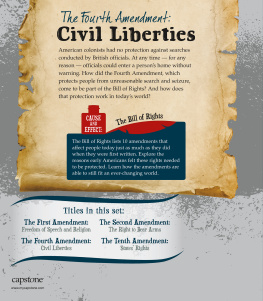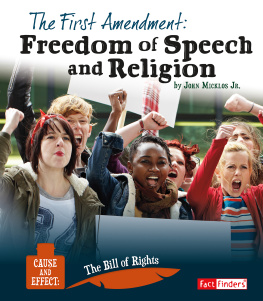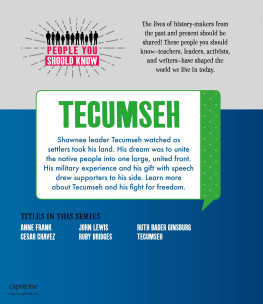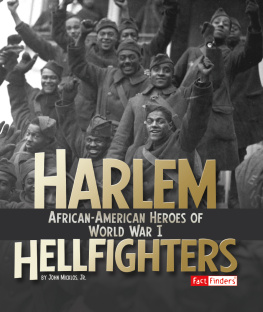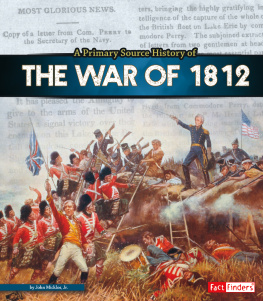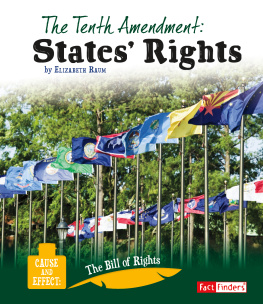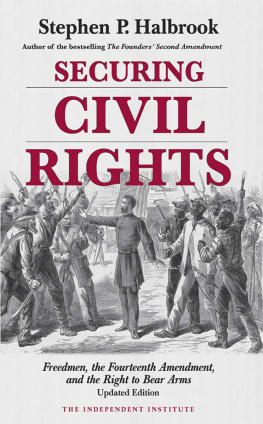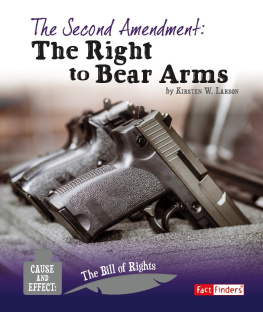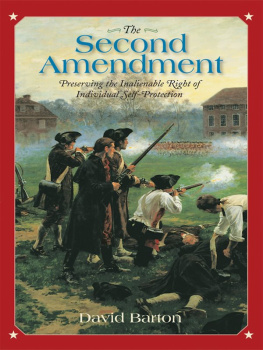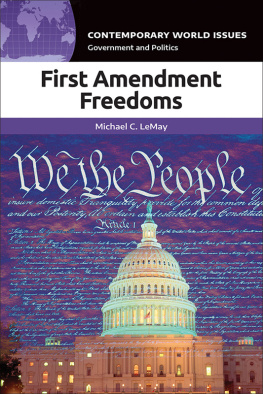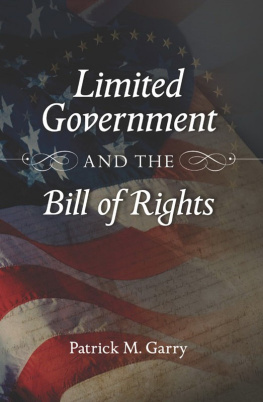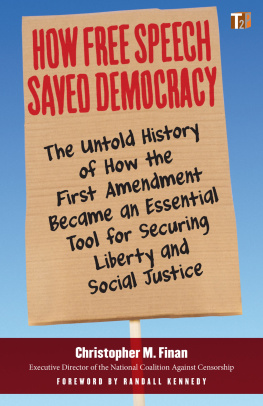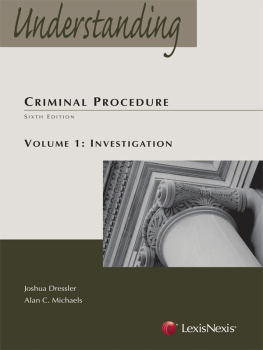John Micklos Jr. - The Fourth Amendment: Civil Liberties
Here you can read online John Micklos Jr. - The Fourth Amendment: Civil Liberties full text of the book (entire story) in english for free. Download pdf and epub, get meaning, cover and reviews about this ebook. year: 2017, publisher: Capstone, genre: Politics. Description of the work, (preface) as well as reviews are available. Best literature library LitArk.com created for fans of good reading and offers a wide selection of genres:
Romance novel
Science fiction
Adventure
Detective
Science
History
Home and family
Prose
Art
Politics
Computer
Non-fiction
Religion
Business
Children
Humor
Choose a favorite category and find really read worthwhile books. Enjoy immersion in the world of imagination, feel the emotions of the characters or learn something new for yourself, make an fascinating discovery.
- Book:The Fourth Amendment: Civil Liberties
- Author:
- Publisher:Capstone
- Genre:
- Year:2017
- Rating:4 / 5
- Favourites:Add to favourites
- Your mark:
- 80
- 1
- 2
- 3
- 4
- 5
The Fourth Amendment: Civil Liberties: summary, description and annotation
We offer to read an annotation, description, summary or preface (depends on what the author of the book "The Fourth Amendment: Civil Liberties" wrote himself). If you haven't found the necessary information about the book — write in the comments, we will try to find it.
The Fourth Amendment: Civil Liberties — read online for free the complete book (whole text) full work
Below is the text of the book, divided by pages. System saving the place of the last page read, allows you to conveniently read the book "The Fourth Amendment: Civil Liberties" online for free, without having to search again every time where you left off. Put a bookmark, and you can go to the page where you finished reading at any time.
Font size:
Interval:
Bookmark:

BILL OF RIGHTS
A loud knock on your front door disturbs your peaceful evening. You peek through your window. Two police officers stand outside.
Let us in, one of them demands. We got a tip there might be criminal activity going on here.
You must have the wrong address, you reply. But the police officer knocks again. You need to let us in, he says.
Do you need to let the officers enter? No. In most cases, the police need a .
The United States gained its freedom from Great Britain in 1783. Four years later, the nations founders drafted the U.S. Constitution. This document described how the new government should be run.
The British had denied certain rights to the colonists. People worried that the new U.S. government might one day take away their freedoms as well. The authors of the Constitution addressed those fears. They added 10 amendments. They called these the Bill of Rights. Most of these amendments spelled out individual rights and freedoms.
The Bill of Rights started with 12 amendments. States failed to pass two of them, leaving just 10.
AMENDMENT
Several amendments in the Bill of Rights listed protections people should have if charged with a crime. The Fourth Amendment gave guidelines for gathering evidence. Others cover the legal process, fair trials, and fair punishments.
The Fourth Amendment protects people against unreasonable search and seizure. What does this mean? Authorities cant search your house without a reason. The amendment also states that no Warrants shall issue, but upon . Authorities must convince a judge to issue a search warrant. They must show that they will probably find evidence of illegal activity.
Congress shall make no law respecting an establishment of religion, or prohibiting the free exercise thereof; or abridging the freedom of speech, or of the press; or the right of the people peaceably to assemble, and to petition the government for a redress of grievances.
A well regulated militia, being necessary to the security of a free state, the right of the people to keep and bear arms, shall not be infringed.
No soldier shall, in time of peace be quartered in any house, without the consent of the owner, nor in time of war, but in a manner to be prescribed by law.
The right of the people to be secure in their persons, houses, papers, and effects, against unreasonable searches and seizures, shall not be violated, and no warrants shall issue, but upon probable cause, supported by oath or affirmation, and particularly describing the place to be searched, and the persons or things to be seized.
No person shall be held to answer for a capital, or otherwise infamous crime, unless on a presentment or indictment of a grand jury, except in cases arising in the land or naval forces, or in the militia, when in actual service in time of war or public danger; nor shall any person be subject for the same offense to be twice put in jeopardy of life or limb; nor shall be compelled in any criminal case to be a witness against himself, nor be deprived of life, liberty, or property, without due process of law; nor shall private property be taken for public use, without just compensation.
In all criminal prosecutions, the accused shall enjoy the right to a speedy and public trial, by an impartial jury of the state and district wherein the crime shall have been committed, which district shall have been previously ascertained by law, and to be informed of the nature and cause of the accusation; to be confronted with the witnesses against him; to have compulsory process for obtaining witnesses in his favor, and to have the assistance of counsel for his defense.
In suits at common law, where the value in controversy shall exceed twenty dollars, the right of trial by jury shall be preserved, and no fact tried by a jury, shall be otherwise reexamined in any court of the United States, than according to the rules of the common law.
Excessive bail shall not be required, nor excessive fines imposed, nor cruel and unusual punishments inflicted.
The enumeration in the Constitution, of certain rights, shall not be construed to deny or disparage others retained by the people.
The powers not delegated to the United States by the Constitution, nor prohibited by it to the states, are reserved to the states respectively, or to the people.
FOURTH AMENDMENT
In England, the government used general warrants to conduct searches. These warrants gave government officials great power. They could search anywhere at any time. They could seize anything they wanted. They entered peoples homes or businesses without warning. They did not even have to explain what they were looking for.
John Entick
In London in 1762, messengers sent by King George III broke into the home of John Entick. Entick had published articles criticizing the king. The messengers searched Enticks house. They broke locks and doors. They seized hundreds of papers. Entick sued the messengers for damaging his property. A judge ruled in Enticks favor. He said the messengers had no good reason for searching Enticks house.

John Wilkes is arrested.
A year later British officials arrested John Wilkes and 48 other people. They accused the men of publishing insults toward the king. Officials searched the mens homes using a general warrant. Wilkes challenged his arrest. He called the search unfair. He won his case in an English court.
American colonists hoped British authorities would follow these rulings in the colonies. They did not. The British used general warrants to conduct searches of peoples homes and offices. People lived in fear of such searches.
Every invasion of private property, be it ever so minute, is a trespass.
Lord Camden, British judge, 1765
No one wants to think about someone breaking into his or her home. The fear is even worse if the people breaking in are government officials. Shortly before the Revolutionary War (17751783), many colonists wanted independence from British rule. The British wanted to prevent this. They tried to silence leaders of the freedom movement.
Using general warrants, British troops made surprise raids. They burst into the homes of people they thought supported independence. Once inside, they searched the entire house. They seized personal items. They even read the persons letters. If these letters criticized the king or spoke out for independence, the person could be charged with .
Font size:
Interval:
Bookmark:
Similar books «The Fourth Amendment: Civil Liberties»
Look at similar books to The Fourth Amendment: Civil Liberties. We have selected literature similar in name and meaning in the hope of providing readers with more options to find new, interesting, not yet read works.
Discussion, reviews of the book The Fourth Amendment: Civil Liberties and just readers' own opinions. Leave your comments, write what you think about the work, its meaning or the main characters. Specify what exactly you liked and what you didn't like, and why you think so.

